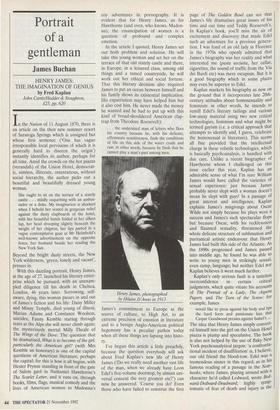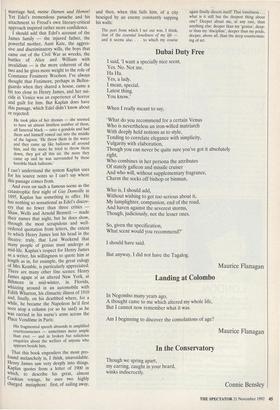Portrait of a gentleman
James Buchan
HENRY JAMES: THE IMAGINATION OF GENIUS by Fred Kaplan John CurtislHodder & Stoughton, £25, pp. 620 In the Nation of 11 August 1870, there is an article on the then new summer resort of Saratoga Springs which is unsigned but whose first sentence (`One has vague irresponsible local previsions of which it is generally hard to discern the origin') instantly identifies its author, perhaps for all time. Amid the crowds on the hot piazza (verandah) of the Union Hotel, democrat- ic, aimless, illiterate, ostentatious, without social hierarchy, the author picks out a beautiful and beautifully dressed young woman.
She ought to sit on the terrace of a stately castle . . . mildly coquetting with an ambas- sador or a duke. My imagination is shocked when I behold her seated in gorgeous relief against the dusty clapboards of the hotel, with her beautiful hands folded in her silken lap, her head drooping slightly beneath the weight of her chignon, her lips parted in a vague contemplative gaze at Mr Helmbold's well-known advertisement on the opposite fence, her husband beside her reading the New York Sun.
Beyond the bright dusty streets, the New York wilderness, 'green, lonely and vacant', presses in.
With this dazzling portrait, Henry James, at the age of 27, launched his literary enter- prise which he pursued, with an unexam- pled diligence till his death in Chelsea, London, 46 years later. Sorrowing, self- aware, dying, this woman passes in and out of James's fiction and his life: Daisy Miller and Minny Temple, died young of illness; Marian Adams and Constance Woolson, suicides; Fanny Kemble staring through tears at the Alps she will never climb again; the mysteriously mortal Milly Theale of The Wings of the Dove. The question that he dramatised, What is to become of the girl, particularly the American girl? (with Mrs Kemble an honorary) is one of the capital questions of American literature, perhaps the capital; for this is how it all begins, with Hester Prynne standing in front of the gate of Salem gaol in Nathaniel Hawthorne's The Scarlet Letter, and it runs on, through books, films, flags, musical comedy and the lives of American women to Madonna's coy adventures in pornography. It is evident that for Henry James, as for Hawthorne (and even, who knows, Madon- na), the emancipation of women is a question of profound and complex emotion.
In the article I quoted, Henry James set out both problem and solution. He will take this young woman and set her on the terrace of that old stately castle and there, in Europe, in a leisured class, among old things and a tamed countryside, he will work out her ethical and social fortune. That this literary decision also required James to put an ocean between himself and his family shows its existential implication. His expatriation may have helped him but it also cost him. He never made the money he wanted and he had to put up with this kind of broad-shouldered American clap- trap from Theodore Roosevelt):
. . . the undersized man of letters who flees his country because he, with his delicate, effeminate sensitiveness, finds the conditions of life on this side of the water crude and raw; in other words, because he finds that he cannot play a man's part among men.
Henry James, photographed by Hilaire D'Arois in 1913 James's commitment to Europe as the source of culture, to High Art, to an extreme precision of emotion in literature and to a benign Anglo-American political hegemony has a peculiar pathos today when all these things are lapsing into histo- ry.
I've begun this article a little preachily, because the question everybody will ask about Fred Kaplan's new life of Henry James (`Do we really need another vast life of the man, when we already have Leon Edel's five-volume doorstop, by almost uni- versal consent the very greatest etc?') can now be answered. 'Course you do! Even those who have failed to construe the first page of The Golden Bowl can see that James's life dramatises great issues of his time and our time and Teddy Roosevelt's. In Kaplan's book, you'll miss the air of excitement and discovery that made Edel such an adventure for a previous genera- tion. I was fond of an old lady in Florence in the 1970s who openly admitted that James's biography was her reality and what interested me (pasta asciutta, her cellar, cigarettes, the sound of traffic from the Via dei Bardi etc) was mere escapism. But it is a good biography which in some places may even be superior to Edel.
Kaplan markets his biography as new on the ground that it incorporates late 20th- century attitudes about homosexuality and feminism: in other words, he intends to remill Edel's literary tailings and various low-assay material using two new critical technologies, feminism and what might be termed gayism (i.e. a critical approach that attempts to identify and, I guess, celebrate the homosexual in literature). This seems all fine provided that the intellectual charge in these volatile technologies, which is basically psychoanalysis, is handled with due care. Unlike a recent biographer of Hawthorne whom I challenged on this issue earlier this year, Kaplan has an admirable sense of what I'm sure William James would have called the varieties of sexual experience: just because James probably never slept with a woman doesn't mean he slept with guys! In a passage of great interest and intelligence, Kaplan explains James's misgivings about Oscar Wilde not simply because his plays were a success and James's such spectacular flops but because Oscar, with his recklessness and flaunted sexuality, threatened the whole delicate structure of sublimation and puritanical artistic endeavour that Henry James had built this side of the Atlantic. As the 1890s progressed and James passed into middle age, he found he was able to write to young men in strikingly sexual, even camp, language; but neither Edel nor Kaplan believes it went much further. Kaplan's only serious fault is a tasteless overconfidence in certain critical judgments, which quite vitiate his accounts of The Portrait of a Lady, The Aspern Papers, and The Turn of the Screw: for example, James
would like to press against his body and lips the hard form and passionate kiss that
Caspar Goodwood presses against Isabel's ... The idea that Henry James simply convert- ed himself into the girl on the Union Hotel piazza is plump and speculative. The book is also not helped by the use of flaky New York psychoanalytical jargon: 'a confronta- tional incident of disaffiliation' is, I believe, our old friend the blood-row. Edel was a tremendous sinner in this regard, as in his famous reading of a passage in the Note- books, where James, playing around with a character he'd called Ledward, wrote Bed- ward-Dedward-Deadward; highly symp- tomatic of fear of death and injury in the marriage bed, meine Damen and Herren! Yet Edel's tremendous panache and his attachment to Freud's own literary-critical approach inspired rather more confidence.
I should add that Edel's account of the James family — the injured father, the powerful mother, Aunt Kate, the aggres- sive and discriminatory wills, the boys that came out of the Civil War as wrecks, the battles of Alice and William with invalidism — is the more coherent of the two and he gives more weight to the role of Constance Fenimore Woolson. I've always thought that Fenimore, perhaps in Bellos- guardo when they shared a house, came a bit too close to Henry James, and her sui- cide in Venice was an experience of horror and guilt for him. But Kaplan does have this passage, which Edel didn't know about or rejected:
He took piles of her dresses — she seemed to have an almost limitless number of them, all funereal black — onto a gondola and had them and himself rowed out into the middle of the lagoon. 'He threw them in the water and they came up like balloons all around him, and the more he tried to throw them down, they got all this air, the more they came up and he was surrounded by these horrible black balloons.'
I can't understand the system Kaplan uses for his source notes so I can't say where this passage comes from. And even on such a famous scene as the catastrophic first night of Guy Domville in 1895, Kaplan has something to offer. He has nothing so sensational as Edel's discov- ery that no fewer than three critics Shaw, Wells and Arnold Bennett — made their names that night, but he does show, through the most scrupulous and well- ordered quotation from letters, the extent to which Henry James lost his head in the theatre: truly, that Lost Weekend that many people of genius must undergo at mid-life. Kaplan's respect for Henry James as a writer, his willingness to quote him at length as in, for example, the great eulogy of Mrs Kemble, is particularly appreciated. There are many other fine scenes: Henry James agape at an altered New York, at Biltmore in mid-winter, in Florida, whizzing around in an automobile with Edith Wharton, his climactic illness of 1910 and, finally, on his deathbed where, for a while, he became the Napoleon he'd first seen atop a column (or so he said) as he was carried in his nurse's arms across the Place Vendome in Paris:
His fragmented speech abounds in amplified courteousnesses — sometimes more ample than ever — and in broken but solicitous enquiries about the welfare of anyone who appears beside him.
That this book engenders the most pro- found melancholy is, I think, unavoidable. Henry James saw very deeply into things. Kaplan quotes from a letter of 1900 in which, to describe his great, almost Cookian voyage, he uses two highly charged metaphors: first, of sailing away, and then, when this fails him, of a city beseiged by an enemy constantly sapping his walls: The port from which I set out was, I think, that of the essential loneliness of my life and it seems also . . . to which my course
again finally directs itself! That loneliness . . . what is it still but the deepest thing about one? Deeper about me, at any rate, than anything else: deeper than my 'genius', deep- er than my 'discipline', deeper than my pride, deeper, above all, than the deep countermin- ing of art.
Dubai Duty Free
I said, 'I want a specially nice scent.
Yes. No. Not me.
Ha Ha.
Yes, a lady.
I mean, special.
Latest thing.
You know.'
When I really meant to say, `What do you recommend for a certain Venus Who is nevertheless an iron-willed matriarch With deeply held notions as to style, Tending to correlate elegance with simplicity, Vulgarity with elaboration, Though you can never be quite sure you've got it absolutely right, Who combines in her persona the attributes Of stately galleon and missile cruiser And who will, without supplementary fragrance, Charm the socks off bishop or binman, Who is, I should add, Without wishing to get too serious about it, My lamplighter, companion, end of the road, And haven against the severest storms, Though, judiciously, not the lesser ones.
So, given the specification, What scent would you recommend?'
I should have said.
But anyway, I did not have the Tagalog.
Maurice Flanagan
Landing at Colombo
In Negombo many years ago, A thought came to me which altered my whole life, But I cannot now remember what it was.
Am I beginning to discover the consolations of age?
Maurice Flanagan
In the Conservatory Though we spring apart, my earring, caught in your beard, winks indiscreetly.
Connie Bensley











































































 Previous page
Previous page